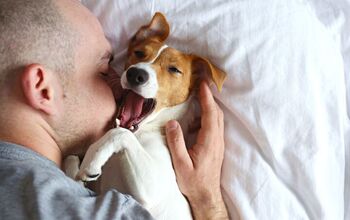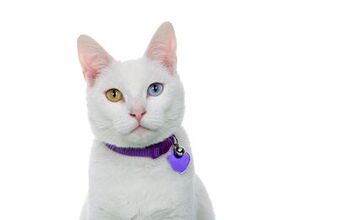Beagles Rescued From a Lab Get a Second Chance at Life in Canada

Three beagles who spent their entire lives in cages in a U.S. laboratory got a second chance at life when they were rescued. The Beagle Alliance, a charity organization from Winnipeg, Canada, rescued the dogs and brought them to Canada, to be adopted into loving forever homes.
The three beagles, named Axel, Nick, and Otis, were held at an unnamed laboratory in the Midwest.
Lori Cohen, The Executive Director of The Beagle Alliance, told USA TODAY that her organization works closely with partners across North America to collectively rescue dogs out of laboratories. It was thanks to this network of partners that The Beagle Alliance found out about these three beagles and managed to rescue them.
“I can’t tell you what laboratory they are from. That’s confidential,” said Cohen. It’s unclear what was done to these three beagles, but most research dogs are used for drug or biomedical testing.
Cohen explained that dogs bred specifically for testing spend their lives living in isolation and require a lot of care and patience to adjust to domestic life.
“These three weren’t very socialized, which is the norm for the animals in research,” shared Cohen. “They really don’t live the life of a dog. They’re not social with each other either. They don’t know how to walk on a leash. They are very unsure of how to play with toys and most of them have PTSD and anxiety in varying degrees.”
Cohen shared that all three rescued beagles are around three years old and doing okay physically. The pooches were medically examined after being rescued and cleared to cross the border and go into Canada.
“Really, the concern lies years ahead,” explained Cohen. “We are not privy to what happens to them in a laboratory. We don’t know what kind of testing was done to them. So we just watch for health concerns going forward.”
According to Cohen, the main reason beagles are so often used in testing is because they are very forgiving and resilient. “We’ve been told by the people in laboratories that they are used because they are very resilient. They’re docile. They don’t bite back. They are very forgiving and unfortunately, they fit easily into a cage.”
“Beagles are bred for animal testing. They are purchased by laboratories from specific breeders who breed for that purpose and so many are bred right into testing,” Cohen added.
She explained that the U.S. laboratories are more regulated compared to those in Canada, where animal protection laws are very lax. Surprisingly, most Canadians are in the dark about animal testing in Canada because everything is very secretive and the country lacks federal legislation.
According to the Humane Society, nearly 60,000 dogs are used for testing each year in the United States, with more than 250 institutions reporting using dogs for experiments. Chemical, pesticide, and drug companies, universities, government facilities, schools, and hospitals are some institutions that report using dogs for testing.
These dogs are used to test a wide range of products from medical devices and drugs, to pesticides, rat poison, and insect repellent.
The three rescued beagles were lucky to make it out alive from the laboratory they were rescued from. Dogs that aren’t as lucky, end up euthanized once the experiment is over.
Rescued beagles have a long way to go, but the worst is behind them. “There’s some decompression to happen and just love and patience, and slowly they come out of their shells,” said Cohen.
No pooch deserves to spend its life suffering in a laboratory! Join the fight to end research and testing on dogs by choosing cruelty-free household and personal care products.

Nevena is a freelance writer and a proud mom of Teo, a 17-year-old poodle, and Bob, a rescued grey tabby cat. Since childhood, she had a habit of picking up strays and bringing them home (luckily, her parents didn't know how to say NO). When she's not writing for her fellow pet parents, Nevena can be found watching Teo sleep. To her defense, that's not as creepy as it sounds!
More by Nevena Nacic























